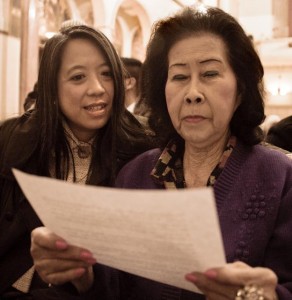Human Services
Through our broad range of social and human services (i.e., cultural orientation, language assistance, survival skills development, crisis intervention, parent education, family preservation strategies, cross-cultural mediation and dispute resolution), we have assisted newcomers with the cultural and transitional issues that serve as barriers to successful integration in a new culture. Our education and advocacy efforts (i.e., legal clinics, redress and restitution for workers, humane immigration policy advocacy, reinstatement of benefits to welfare recipients) have helped to protect the rights of Thai immigrants, workers, welfare recipients, and trafficked victims. By integrating community economic development strategies (i.e. development of affordable housing, small business development assistance to Thai-owned businesses, neighborhood reinvestment and revitalization efforts through the campaign to designate “Thai Town”), Thai CDC has made economic opportunities more accessible to Thai immigrants and increased their potential for economic mobility.
 .
.

 Marginalized Families Face:
Marginalized Families Face:
- job insecurity
- health risks
- low educational attainment
- financial instability
We provide access to critical programs and services.
Identified Needs
Health – At minimal, the community is in need of basic information and referral about health services.
Legal – The predominant legal service need for the Thai community is in the area of immigration. Assistance with relative/spousal petitions, representation at deportation proceedings, naturalization for citizenship and the labor certification process is greatly needed. The second legal service need is in the area of wage and hour claims for Thai workers who are abused and exploited in the workplace. Thai immigrants also need legal consultations in the areas of landlord tenant issues, consumer rights, and governmental benefits.
Senior – Programs and services that help Thai seniors enjoy an improved state of health and well-being are critically needed. Essential services include programs that would provide health care navigational and escort services, nutrition information and meals, and recreation and health screening.
Youth – Recreational programs and activities are extremely limited in the Thai community. The need exists for tutoring and mentoring programs, leadership development, alcohol and substance abuse prevention, gang prevention and youth employment.
Self-sufficiency – Access to economic opportunities, affordable housing and child care, adult education, financial literacy, banking services, and savings accounts are critical for economic self-sufficiency and financial stability of working poor Thais.
Family – To overcome the stress and tension associated with the acculturation process that can lead to family disintegration, family preservation strategies need to be employed and may include parenting classes, domestic violence and child abuse hotlines, battered women shelters, case management, family based advocacy, cross cultural mediation and dispute resolution, and crisis counseling.
